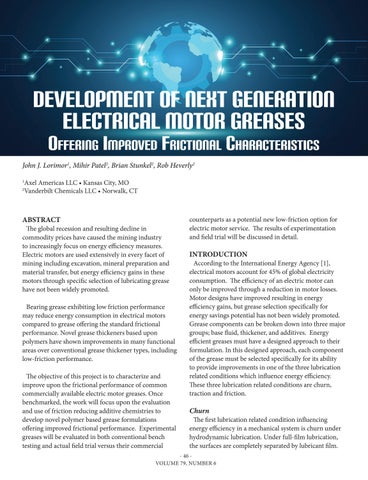Development of Next Generation Electrical Motor Greases Offering Improved Frictional Characteristics
John J. Lorimor1, Mihir Patel2, Brian Stunkel2, Rob Heverly2 Axel Americas LLC • Kansas City, MO Vanderbilt Chemicals LLC • Norwalk, CT
1 2
ABSTRACT
The global recession and resulting decline in commodity prices have caused the mining industry to increasingly focus on energy efficiency measures. Electric motors are used extensively in every facet of mining including excavation, mineral preparation and material transfer, but energy efficiency gains in these motors through specific selection of lubricating grease have not been widely promoted. Bearing grease exhibiting low friction performance may reduce energy consumption in electrical motors compared to grease offering the standard frictional performance. Novel grease thickeners based upon polymers have shown improvements in many functional areas over conventional grease thickener types, including low-friction performance. The objective of this project is to characterize and improve upon the frictional performance of common commercially available electric motor greases. Once benchmarked, the work will focus upon the evaluation and use of friction reducing additive chemistries to develop novel polymer based grease formulations offering improved frictional performance. Experimental greases will be evaluated in both conventional bench testing and actual field trial versus their commercial
counterparts as a potential new low-friction option for electric motor service. The results of experimentation and field trial will be discussed in detail.
INTRODUCTION
According to the International Energy Agency [1], electrical motors account for 45% of global electricity consumption. The efficiency of an electric motor can only be improved through a reduction in motor losses. Motor designs have improved resulting in energy efficiency gains, but grease selection specifically for energy savings potential has not been widely promoted. Grease components can be broken down into three major groups; base fluid, thickener, and additives. Energy efficient greases must have a designed approach to their formulation. In this designed approach, each component of the grease must be selected specifically for its ability to provide improvements in one of the three lubrication related conditions which influence energy efficiency. These three lubrication related conditions are churn, traction and friction.
Churn
The first lubrication related condition influencing energy efficiency in a mechanical system is churn under hydrodynamic lubrication. Under full-film lubrication, the surfaces are completely separated by lubricant film.
- 46 VOLUME 79, NUMBER 6






